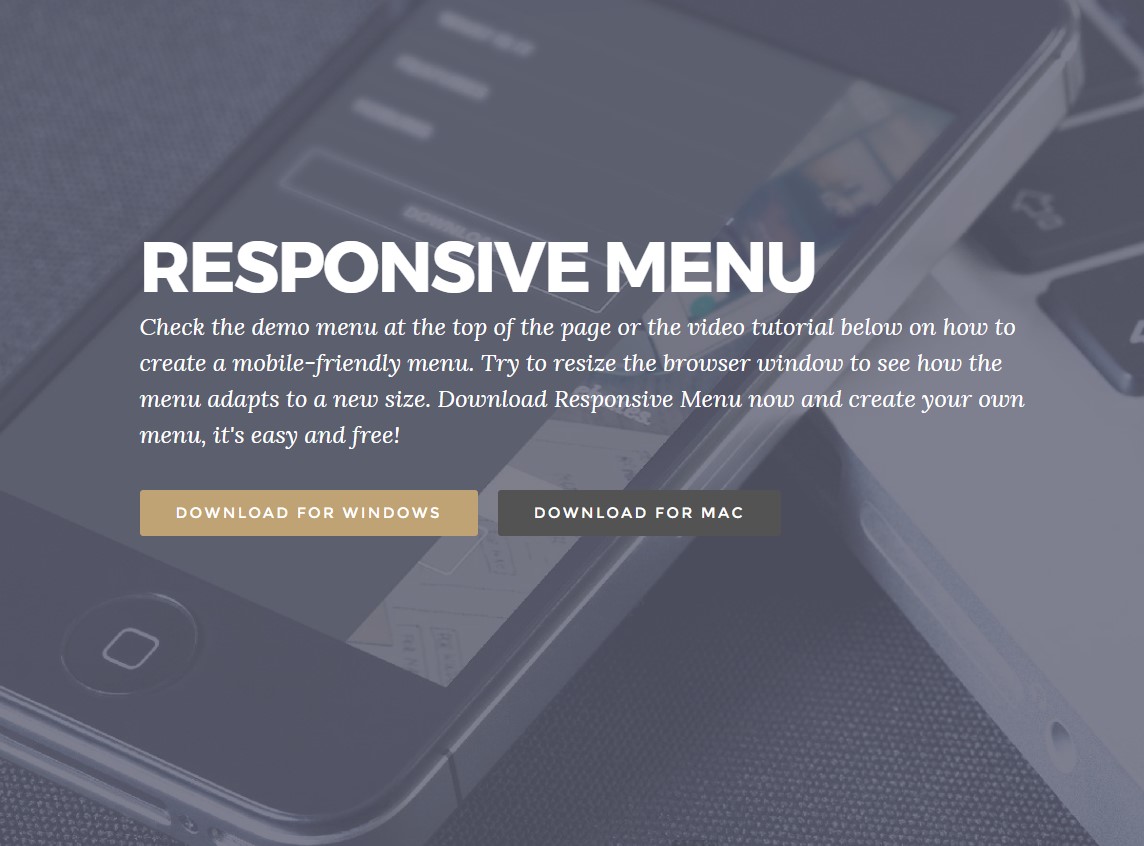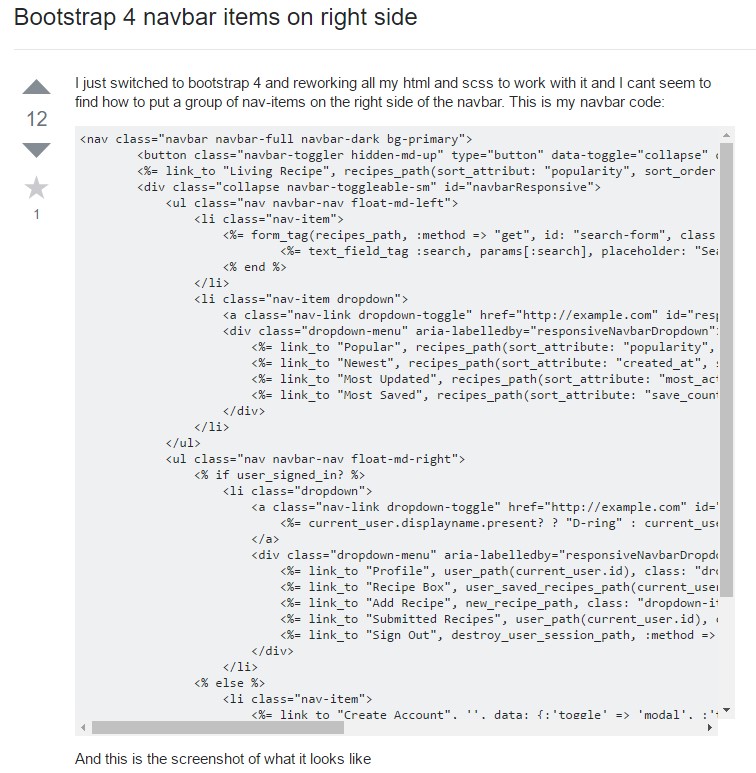Bootstrap Menu HTML
Intro
Even the easiest, not stating the more challenging web pages do require certain kind of an index for the website visitors to effortlessly navigate and locate what they are actually seeking in the first couple of seconds avter their coming over the webpage. We have to normally think a customer could be in a hurry, looking a number of webpages briefly scrolling over them trying to find a product or decide. In these circumstances the understandable and effectively stated navigating menu might possibly create the difference when comparing one unique website visitor and the web page being actually clicked away. So the building and behavior of the web page navigating are crucial in fact. In addition our web sites get increasingly more viewed from mobiles in this way not owning a web page and a navigation in particular acting on smaller sreens basically comes up to not owning a webpage in any way and even worse.
Luckily the brand-new 4th version of the Bootstrap system provides us with a impressive tool to handle the situation-- the so called navbar feature or else the selection bar people got used viewing on the top of most pages. It is a helpful yet effective tool for wrapping our brand's status information, the pages building and a search form or a handful of call to action buttons. Let us see just how this whole thing gets handled inside Bootstrap 4.
Tips on how to employ the Bootstrap Menu Tutorial:
First we desire a <nav> element to cover things up. It should additionally possess the .navbar class and in addition certain styling classes designating it one of the predefined in Bootstrap 4 appearances-- just like .navbar-light incorporated with .bg-faded or bg-inverse with .navbar-inverse.
You have the ability to likewise employ some of the contextual classes just like .bg-primary, .bg-warning and so on which all had the brand-new version of the framework.
Yet another bright new element presented in the alpha 6 of Bootstrap 4 system is you have to likewise assign the breakpoint at which the navbar must collapse to become presented once the selection button gets clicked. To complete this put in a .navbar-toggleable- ~the desired viewport size ~ to the <nav> element.
Next move
Next we need to develop the so called Menu button which in turn will show in the location of the collapsed Bootstrap Menu Styles and the customers will definitely utilize to take it back on. To execute this create a <button> component along with the .navbar-toggler class and certain attributes, such as data-toggle =“collapse” and data-target =“ ~ the ID of the collapse element we will create below ~ ”. The default positioning of the navbar toggle button is left, and so supposing that you want it right aligned-- in addition add the .navbar-toggler-right class-- as well a bright fresh Bootstrap 4 component.
Sustained web content
Navbars taken place using incorporated help for a number of sub-components. Pick from the following as needed :
.navbar-brand for your project, product, or company name.
.navbar-nav for a lightweight and full-height site navigation (including help for dropdowns).
.navbar-toggler application together with Bootstrap collapse plugin and additional navigation toggling activities.
.form-inline for each form controls and responses.
.navbar-text for putting in vertically centered strings of content.
.collapse.navbar-collapse for organizing and hiding navbar components by a parent breakpoint.
Here's an illustration of every the sub-components involved in a responsive light-themed navbar that promptly collapses at the md (medium) breakpoint.

<nav class="navbar navbar-toggleable-md navbar-light bg-faded">
<button class="navbar-toggler navbar-toggler-right" type="button" data-toggle="collapse" data-target="#navbarSupportedContent" aria-controls="navbarSupportedContent" aria-expanded="false" aria-label="Toggle navigation">
<span class="navbar-toggler-icon"></span>
</button>
<a class="navbar-brand" href="#">Navbar</a>
<div class="collapse navbar-collapse" id="navbarSupportedContent">
<ul class="navbar-nav mr-auto">
<li class="nav-item active">
<a class="nav-link" href="#">Home <span class="sr-only">(current)</span></a>
</li>
<li class="nav-item">
<a class="nav-link" href="#">Link</a>
</li>
<li class="nav-item">
<a class="nav-link disabled" href="#">Disabled</a>
</li>
</ul>
<form class="form-inline my-2 my-lg-0">
<input class="form-control mr-sm-2" type="text" placeholder="Search">
<button class="btn btn-outline-success my-2 my-sm-0" type="submit">Search</button>
</form>
</div>
</nav>Brand
The .navbar-brand can certainly be utilized to the majority of the components, but an anchor operates better given that several components might demand utility classes or custom made formats.

<!-- As a link -->
<nav class="navbar navbar-light bg-faded">
<a class="navbar-brand" href="#">Navbar</a>
</nav>
<!-- As a heading -->
<nav class="navbar navbar-light bg-faded">
<h1 class="navbar-brand mb-0">Navbar</h1>
</nav>Nav
Navbar navigation hyperlinks based on Bootstrap .nav alternatives with their own modifier class and need the usage of toggler classes for appropriate responsive designing. Navigation in navbars will likewise grow to utilize as much horizontal space as possible to have your navbar information nicely straightened.
Active states-- with .active-- to reveal the current webpage may possibly be employed directly to .nav-links or else their immediate parent .nav-items.

<nav class="navbar navbar-toggleable-md navbar-light bg-faded">
<button class="navbar-toggler navbar-toggler-right" type="button" data-toggle="collapse" data-target="#navbarNav" aria-controls="navbarNav" aria-expanded="false" aria-label="Toggle navigation">
<span class="navbar-toggler-icon"></span>
</button>
<a class="navbar-brand" href="#">Navbar</a>
<div class="collapse navbar-collapse" id="navbarNav">
<ul class="navbar-nav">
<li class="nav-item active">
<a class="nav-link" href="#">Home <span class="sr-only">(current)</span></a>
</li>
<li class="nav-item">
<a class="nav-link" href="#">Features</a>
</li>
<li class="nav-item">
<a class="nav-link" href="#">Pricing</a>
</li>
<li class="nav-item">
<a class="nav-link disabled" href="#">Disabled</a>
</li>
</ul>
</div>
</nav>Forms
Place different form controls and elements within a navbar having .form-inline.

<nav class="navbar navbar-light bg-faded">
<form class="form-inline">
<input class="form-control mr-sm-2" type="text" placeholder="Search">
<button class="btn btn-outline-success my-2 my-sm-0" type="submit">Search</button>
</form>
</nav>Text
Navbars may possibly contain pieces of text message with help from .navbar-text. This class adjusts vertical placement and horizontal space for strings of text.

<nav class="navbar navbar-light bg-faded">
<span class="navbar-text">
Navbar text with an inline element
</span>
</nav>Yet another component
One other brilliant brand new function-- in the .navbar-toggler you should set a <span> together with the .navbar-toggler-icon to actually establish the icon in it. You can additionally install an element using the .navbar-brand here and demonstrate a little bit relating to you and your organization-- like its title and symbol. Additionally you might just decide wrapping all stuff within a link.
Next we ought to generate the container for our menu-- it will extend it in a bar having inline items over the defined breakpoint and collapse it in a mobile phone view below it. To carry out this establish an element using the classes .collapse and .navbar-collapse. In the case that you have taken a look at Bootstrap 3 and Bootstrap 4 up to alpha 5 classes construction you will most likely notice the breakpoint has been assigned only once-- to the parent element yet not to the .navbar-toggler and the .collapse feature itself. This is the brand-new manner in which the navbar will be from Bootstrap 4 alpha 6 so bear in mind what version you are currently working with if you want to construct things correctly.
End part
Finally it is definitely time for the real site navigation menu-- wrap it in an <ul> element with the .navbar-nav class-- the .nav class is no longer required. The particular menu things should be wrapped inside <li> elements holding the .nav-item class and the actual hyperlinks in them should have .nav-link employed.
Conclusions
And so generally this is actually the construction a navigational Bootstrap Menu Tutorial in Bootstrap 4 need to carry -- it's pretty useful and intuitive -- right now the only thing that's left for you is planning the correct building and beautiful titles for your web content.
Review a couple of video clip guide regarding Bootstrap Menu
Connected topics:
Bootstrap menu main documentation

Mobirise Bootstrap menu

Bootstrap Menu on the right side

HTML Bootstrap Hamburger Menu Templates
HTML Bootstrap Collapse Menu Templates